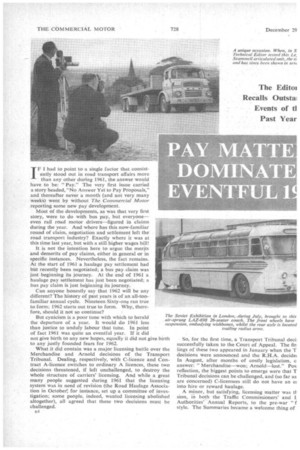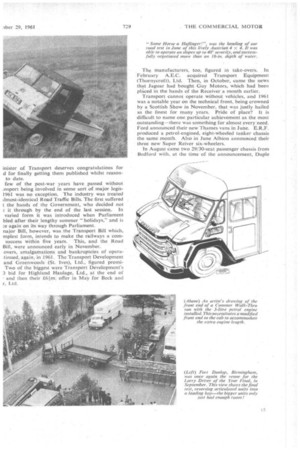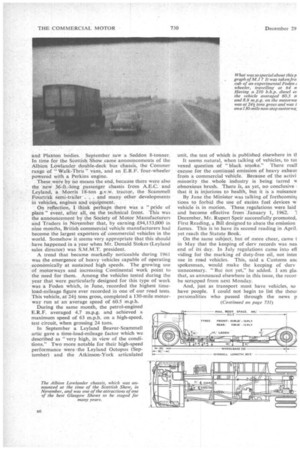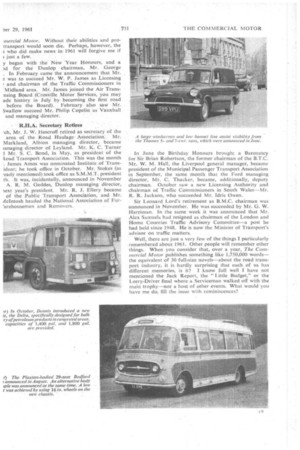The Editoi Recalls Outstai Events of ti Past Year
Page 38

Page 39

Page 40

Page 43

If you've noticed an error in this article please click here to report it so we can fix it.
IF I had to point to a single factor that consistently stood out in road transport affairs more than any other during 1961, the answer would have to be: "Pay." The very first issue carried a story headed, "No Answer Yet to Pay Proposals," and thereafter never a month (and not very many weeks) went by without The Commercial Motor reporting some new pay development.
Most of the developments, as was that very first story, were to do with bus pay, but everyone— even rail road motor drivers—figured in claims during the year. And where has this now-familiar round of claim, negotiation and settlement left the road transport industry? Exactly where it was at this time last year, but with a still higher wages bill!
It is not the intention here to argue the merits and demerits of pay claims, either in general or in specific instances. Nevertheless, the fact remains. At the start of 1961 a haulage pay settlement had but recently been negotiated; a bus pay. claim was just beginning its journey. At the end of 1961 a haulage pay settlement has just been negotiated; a bus pay claim is just beginning its journey.
Can anyone honestly say that 1962 will be any different? The history of past years is of an all-toofamiliar annual cycle. Nineteen Sixty-one ran true to form; 1962 starts out true to form. Why, therefore, should it not so continue?
But cynicism is a poor tune with which to herald the departure of a year. It would do 1961 less than justice to unduly labour that tune. In point of fact 1961 was quite an eventful year. If it did not give birth to any new hopes, equally it did not give birth to any justly founded fears for 1962.
What it did contain was a major licensing battle over the Merchandise and Arnold decisions of the Transport Tribunal. Dealing, respectively, with C-licence and Contract A-licence switches to ordinary A licences, these two decisions threatened, if left unchallenged, to destroy the whole structure of carriers' licensing. And while a great many people suggested during 1961 that the licensing system was in need of revision (the Road Haulage Association in October*, for instance, set up a committee of investigation; some people, indeed, wanted licensing abolished altogether), all agreed that these two decisions must be challenged. So, for the first time, a Transport Tribunal deci: successfully taken to the Court of Appeal. The fir lings of these two appeared in January when the T decisions were announced and the R.H.A. decide( In August, after months of costly legislation, c answer: "Merchandise—won; Arnold—lost." Pos. reflection, the biggest points to emerge were that T Tribunal decisions can be challenged, and (so far as are concerned) C-licensees still do not have an et into hire or reward haulage.
A minor, but satisfying, licensing matter was tt sion, in both the Traffic Commissioners' and I Authorities' Annual Reports, to the pre-war "f style. The Summaries became a welcome thing of Mister of Transport deserves congratulations for d for finally getting them published whilst reasonto date.
few of the post-war years have passed without Lnsport being involved in some sort of major legis1961 was no exception. The industry was treated itmost-identical Road Traffic Bills. The first suffered L the hands of the Government, who decided not .! it through by the end of the last session. In varied form it was introduced when Parliament bled after their lengthy summer "holidays," and is again on its way through Parliament.
najor Bill, however, was the Transport Bill which, mplest form, intends to make the railways a cornsuccess within five years. This, and the Road Bill, were announced early in November.
,overs, anialgarnations and bankruptcies of opera.tinued, again, in 1961. The Transport Development and Greenwoods (St. Ives), Ltd., figured prorniTwo of the biggest were Transport Development's a bid for Highland Haulage, Ltd., at the end of
• and then their £6m. offer in May for Beck and r, Ltd. The manufacturers, too, figured in take-overs. In February A.E.C. acquired Transport Equipment (Thornycroft), Ltd. Then, in October, came the news that Jaguar had bought Guy Motors, which had been pG.ced in the hands of the Receiver a month earlier.
Transport cannot operate without vehicles, and 1961 was a notable year on the technical front, being crowned by a Scottish. Show in November, that was justly hailed as the finest for many years. Pride of place? It is difficult to name one particular achievement as the most outstanding—there was something for almost every need. Ford announced their new Thames vans in June. E.R.F. produced a petrol-engined, eight-wheeled tanker chassis the same month. Also in June Albion announced their three new Super Reiver six-wheelers.
In August came two 29/30-seat passenger chassis from Bedford with, at the time of the announcement, Duple and PIaxton bodies. September saw a Seddon 8-tonner. In time for the Scottish Show came announcements of the Albion Lowlander double-deck bus chassis, the Commer range of " Walk-Thru " vans, and an E.R.F. four-wheeler powered with a Perkins engine.
These were by no means the end, because there were also the 'new 36-ft.-long passenger chassis from A.E.C. and Leyland, a Morris 18-ton g.v.w. tractor, the Scammell Fourtrak semi-trailer . . . and many other developments in vehicles, engines and equipment.
On reflection, 1 think perhaps there was a "pride of place" event, after all, on the technical front. This was the announcement by the Society of Motor Manufacturers and Traders in November that, by earning £94,153,000 in nine months, British commercial vehicle manufacturers had become the largest exporters of commercial vehicles in the world. Somehow it seems very appropriate that this should have happened in a year when Mr. Donald Stokes (Leyland sales director) was S.M.M.T. president.
A trend that became markedly noticeable during 1961 was the emergence of heavy vehicles capable of operating economically at sustained high speeds. The growing use of motorways and increasing Continental work point to the need for them. Among the vehicles tested during the year that were particularly designed for this type of work was a Foden which, in June, recorded the highest timeload-mileage figure ever recorded in one of our road tests. This vehicle, at 24-1, tons gross, completed a 130-mile motorway run at an average speed of 60.5 mph.
During the same month, the petrol-engined E.R.F. averaged 4.7 m.p.g. and achieved a maximum speed of 63 m.p.h. on a high-speed, test circuit, when grossing 24 tons.
In September a Leyland Beaver-Scarnmell artic gave a time-load-mileage factor which we described as "very high, in view of the conditions." Two more notable for their high-speed performance Were \ the Leyland Octopus (September) and the Atkinson-York articulated unit, the test of which is published elsewhere in tl
It seems natural, when talking of vehicles, to tut vexed question of "black. smoke." There reall excuse for the continual emission of heavy exhaus from a commercial vehicle. Because of the activi. minority the . whole industry is being tarred vs obnoxious brush. There Is, as yet, no conclusive that it is injurious to health, but it is a nuisance
By June the Minister was talking of forthcomim lions to forbid the use of excess fuel devices w vehicle is in motion. These regulations were laid and become effective from January 1, 1962. 1 December, Mr. Rupert Speir successfully promoted, First Reading, a Bill designed to abate the emission fumes. This is to have its second reading in April, yet reach the Statute Book.
On the same subject, but of more cheer, came t in May that the keeping of dery records was nea end of its day. In July regulations came into ell 'riding for the marking of duty-free oil, not inter use in road vehicles. This, said a Customs an spokesman, would make the keeping of -dery unnecessary. "But not yet," he added. I am gla, that, as announced elsewhere in this issue, the recor be scrapped from next Monday.
And, just as transport must have vehicles, so have people. I could not begin to list the thou personalities who passed through the news p (Continued on page 731)
ntercial Motor. Without their abilities and protransport would soon die. Perhaps, however, the s who did make news in 1961 will forgive me if just a few.
y began with the New Year Honours, and a xl for the Dunldp chairman, Mr. George , In February came the announcement that Mr.
was to succeed Mr. W. P. James as Licensing , and chairman of the Traffic Commissioners in Midland area. Mr. James joined the Air Transnsing Board (Crosville Motor Services, you may ade history in July by becoming the first road before the Board). February also saw Mr. swallow succeed Mr. Philip Copelin as Vauxhall and managing director.
RBA. Secretary Retires -ch, Mr. J. W. Hescroff retired as secretary of the
area of the Road Haulage Association. Mr. Markland, Albion managing director, became ianaging director of Leyland. Mr. K. C. Turner Mr. S. C. Bond, in May, as president of the load Transpoit Association. This was the month • James Amos was nominated Institute of Transident; he took office in October. Mr. Stokes (as .eady mentioned) took office as S.M.M.T. president th. It was, incidentally, announced in November A. R. M. Geddes, Dunlop managing director, )ext year's president. Mr. R. J. Ellery became
of the Public Transport Association, and Mr. rleIntosh headed the National Association of Fur'arehousemen and Remmers. In June the Birthday Honours brought a Baronetcy for Sir Brian Robertson, the former chairman of the B.T.C. Mr. W. M. Hall, the Liverpool general manager, became president of the Municipal Passenger Transport Association in September, the same month that the Ford managing director, Mr. C. Thacker, became, additionally, deputy chairman. October saw a new Licensing Authority and chairman of Traffic Commissioners in South Wales—Mr. R. R. Jac-kson, who succeeded Mr. Idris Owen.
Sir Leonard Lord's retirement as B.M.C. chairman was announced in November. He was succeeded by Mr. G. W. Harriman. In the same week it was announced that Mr. Alex Samuels had resigned as chairman of the London and Home Counties Traffic Advisory Committee—a post he had held since 1948. He is now the Minister of Transport's advisor on traffic matters.
Well, there are just a very few of the things I particularly remembered about 1961. Other people will remember other things. When you consider that, over a year, The Commercial Motor publishes something like 1,750,000 words— the equivalent of 30 full-size novels—about the road transport industry, it is hardly surprising that each of us has different memories, is it? I know full well I have not mentioned the Jack Report, the "Little Budget," or the Lorry-Driver final where a Serviceman walked off with the main trophy—nor a host of other events. What would you have me do, fill the issue with reminiscences?




























































































